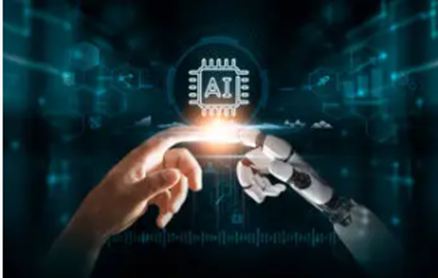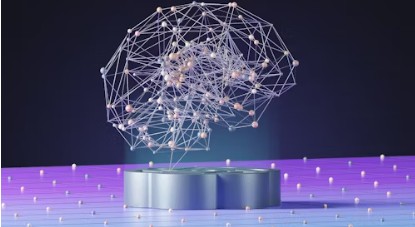AI, or Artificial Intelligence, is the brainpower of machines, making them smarter, faster, and more intuitive. It powers everything from your voice assistant to self-driving cars, allowing devices to learn, adapt, and make decisions just like humans. By analysing massive amounts of data, AI can predict trends, automate tasks, and even personalize your experience online. Imagine a world where technology doesn’t just follow instructions but can think, learn, and evolve—the possibilities are endless. In this bog we will discuss how AI is shaping the industry and workforce along with its future potential!

How AI is Transforming Jobs Across Industries
Artificial Intelligence (AI) is no longer just a buzzword—it’s reshaping industries and the workforce in profound ways. As AI automates repetitive tasks, it’s creating new job opportunities, increasing productivity, and driving innovation. Here’s how AI is transforming various industries and opening up exciting career paths.
- Healthcare: Revolutionizing Patient Care
In healthcare, AI is changing the way we diagnose and treat diseases. AI-powered tools, like IBM Watson Health, are already being used to analyse medical data and assist doctors in diagnosing conditions like cancer with remarkable accuracy. Imagine an AI system that scans medical images and identifies potential issues in seconds, helping doctors make faster, more informed decisions. As these technologies evolve, there’s a growing demand for AI specialists, data analysts, and medical developers. In fact, AI could soon play a role in automating surgeries, allowing medical professionals to focus more on complex procedures.
PathAI is using machine learning to assist pathologists in diagnosing diseases more accurately and quickly, improving patient outcomes.
- Manufacturing: Boosting Efficiency and Productivity
AI in manufacturing is all about optimizing production lines and predicting equipment failures before they happen. Predictive maintenance, powered by AI, helps manufacturers like Siemens reduce downtime and save millions of dollars. With AI taking over repetitive tasks, skilled workers are now needed to oversee complex operations and improve processes. Companies are hiring robotics engineers, data scientists, and AI developers to innovate further.
General Electric uses AI to predict when industrial machines are likely to fail, allowing them to perform maintenance before it impacts production, thus saving time and costs.
- Finance: Enhancing Decision-Making and Security
AI is transforming finance by automating tasks like fraud detection, customer service, and portfolio management. Banks like JPMorgan Chase have integrated AI to analyse transactions in real-time and detect fraudulent activity, improving security. With AI-driven tools offering personalized financial recommendations, the finance sector needs more data scientists, machine learning experts, and AI strategists to drive innovation.
- Retail: Personalized Shopping Experiences
Retailers are using AI to deliver personalized shopping experiences, automate inventory management, and predict future consumer trends. AI systems, like the ones used by Amazon, analyse user behaviour to recommend products tailored to individual preferences, enhancing customer satisfaction. As AI becomes an integral part of the retail experience, businesses are hiring professionals to manage and optimize these systems, opening up roles in AI analysis and e-commerce strategy.
Macy’s is using AI-driven robots to help with inventory management, allowing employees to focus on customer service and improving in-store experiences.
- Transportation & Logistics: The Rise of Autonomous Systems
AI is revolutionizing transportation with self-driving vehicles, drones, and optimized delivery systems. Companies like Tesla are leading the charge with autonomous cars, and drones are already delivering packages in some regions. As these systems become more common, there’s a growing need for engineers, data analysts, and logistics coordinators to develop, maintain, and improve autonomous technologies.

Creating New Opportunities in the Workforce
AI isn’t just about replacing jobs—it’s creating new ones. As AI automates routine tasks, it frees up workers to focus on more creative and complex problems. For example, in construction, AI can assist with site surveys and inventory checks, which were once done manually by skilled workers. Now, these workers are taking on more high-value tasks, such as project management and innovation, driving demand for skilled labour.
In the energy sector, companies like Shell are using AI to predict equipment failures and optimize resource allocation, creating new jobs in AI and data management roles.
Additionally, AI’s ability to predict patterns and make data-driven decisions is making roles in data science and machine learning more crucial. Even entry-level positions are being transformed, as AI helps workers in fields like customer service and logistics streamline their tasks, improving overall efficiency and creating new opportunities for growth.
How AI Will Revolutionize Industries and Everyday Life by 2030
By 2030, AI will be integrated into almost every aspect of our lives, making daily tasks more efficient and redefining entire industries.
- Transportation: The Era of Autonomous Vehicles
Self-driving cars, trucks, and drones will be commonplace. Commuting will become a time for relaxation or productivity, as autonomous vehicles handle the driving. Logistics will also be streamlined, with AI systems optimizing delivery routes in real-time, reducing delays and costs.
Waymo, a subsidiary of Alphabet (Google), is already testing fully autonomous vehicles in select cities, paving the way for the future of driverless transportation.
- Healthcare: More Personalized and Efficient Care
AI will revolutionize healthcare by allowing doctors to provide more personalized treatments based on vast amounts of patient data. Remote monitoring systems will enable doctors to keep track of patients’ conditions from a distance, and AI will assist in surgeries with greater precision. This will improve overall healthcare outcomes while making treatments more accessible and cost-effective.
- Education: AI-Powered Learning
By 2030, AI will transform education by creating personalized learning experiences for students. AI-driven platforms will adapt to each student’s learning style, ensuring that they grasp concepts at their own pace. Teachers will be able to use AI tools to track student progress and tailor lessons accordingly, enhancing overall learning outcomes.
- Entertainment: Personalized Content
AI will make entertainment more interactive and personalized. Streaming platforms will curate content not just based on your viewing history but by predicting what you’re likely to enjoy next. Whether it’s movies, music, or gaming, AI will provide experiences tailored specifically to your preferences.
AI is not just changing the world of work; it’s reshaping the way we interact with technology. By 2030, AI will have made tasks smarter, faster, and more personalized. But with this transformation comes responsibility—ensuring that AI benefits society as a whole, addressing concerns such as data privacy, and embracing its potential for widespread innovation.

 April 14, 2025
April 14, 2025